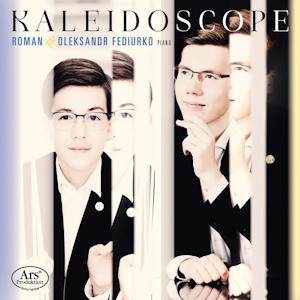
Kaleidoscope
Roman Fediurko, Oleksandr Fediurko (piano)
rec. 2023, Kulturzentrum Immanuel, Austria
Ars Produktion ARS38757 SACD [56]
Kaleidoscope showcases the talents of Ukrainian brothers Roman and Oleksandr Fediurko who moved to Graz after the Russian invasion of their homeland. At the release of this disc Roman was eighteen and Oleksandr some five years younger and it was spurred on by Roman’s 2023 triumph at the Vladimir Horowitz International Competition in Geneva where he took the Gold Medal, the audience prize and five special awards.
The brothers take equal honours in this somewhat encore style recital, no bad thing I feel and there is enough unfamiliar music here to encourage those who want to look beyond the beaten path; really it is only the Schumann, Mendelssohn and Albéniz items that might be termed beaten track. It is also a chance to hear a little of the music of their homeland that is seldom heard outside of the Ukraine. Both brothers revel in the virtuoso repertoire and younger sibling Oleksandr shows he has fingers with an impressive Etude en forme de valse by Saint-Saëns that has plenty of style and verve. I would say the same of his Triana which dazzles after a correct but rather stiff opening. His Schumann and Mendelssohn is more than competent without ousting any favourites. Roman provides his share of the fireworks with Alfred Grünfeld’s suave and frothy confection based on Strauss’s die Feldermaus waltzes and a real finger-twister in Josef Hofmann’s Kaleidoskop, the last of his four character sketches in a performance that as it transpires is full of character and kaleidoscopic. It can be found on a disc with Hofmann himself at the piano as part of his 1938 Casimir Hall recital (Marston Records 52014-2) as well live and studio versions from Hofmann’s pupil Shura Cherkassky though I would hardly call it, as the booklet does, a frequently played encore unless it means frequently played by Fediurko. The duet items are fun, well played and mostly lightweight. Two are by Ukrainian composer Myroslaw Skoryk who died as recently as 2020 though his romantically folk inspired Melodie would not suggest such a contemporary voice. His jazz paraphrase on Für Elise is Beethoven with a Latin twist – El Beethoven perhaps – and the Libertango is even more earthy and spirited.
The works that attract me most here are the short pieces by Kosenko and Revutsky. Viktor Kosenko had studied piano with famed pedagogue Alexander Michałowski and when the outbreak of World War One forced a return to St. Petersburg he studied composition with Mikhail Sokolov. His mazurkas are like Scriabin’s early set, also op.3, in that they build upon Chopin’s dances with a Slavic folkloric colour. The sparkling middle section of the first recalls the salon waltzes of the golden age pianists – Mischa Levitski springs to mind. His romanticism continues in his Poème, Désir though there is something of Scriabin’s serpentine sensuousness in its figuration. Revutsky is represented by four préludes that date from around the time of his graduation from the Kyiv Conservatory where he had composition lessons with its director Reinhold Glière. The prélude op.4 no.1, influenced by the miniatures of Liadov and Scriabin, is a beautiful, impassioned piece that I love to play and it is a delight to have it included here alongside his other admittedly Scriabinesque early pieces, the vigorous and etude like C sharp minor prélude, the coruscating op.7 no.2 and the elegiac op.7 no.1. Roman plays them all magnificently.
Performance and sound wise this is a recital to enjoy and I am sure we will hear more of both brothers. I do have an issue with the booklet’s proof-reader. Oleksandr is described on different pages as both 12 and 13 at the time of release, Scarlatti shares Kosenko’s dates, and Kosenko shares Skoryk’s dates. Schumann died in 1856 not 1854 and despite the contents listing Khatia and Gvantsa Buniatishvili as the authors of the Piazzolla transcription the notes describe the brothers as playing a “very special bravura number; their own, four-hands version of Astor Piazzolla’s Libertango”. I also have to wonder if I am assigning the performances correctly – a yellow diamond indicates Roman is playing and a blue diamond is for Oleksandr. I have to assume that the black diamond next to the Saint-Saëns and Albéniz is a misprinted blue one but maybe not. Thankfully it does not affect the very fine playing on this enjoyable disc.
Rob Challinor
Help us financially by purchasing from


Contents
Myroslaw Skoryk (1938-2020)
Melodie in A minor (1981)
Jazz-paraphrase on Beethoven’s Für Elise (2008)
Camille Saint-Saëns (1835-1921)
Etude en forme de valse No.6 from Etudes Op.52 (1877)
Domenico Scarlatti (1685-1757)
Sonata in B minor K.27 (1738)
Viktor Kosenko (1896-1938)
Mazurkas Op.3 Nos.1 and 2 (1916/1920)
Poème – Désir Op.11 No.1 (1921)
Isaac Albéniz (1860-1909)
Triana from Iberia Bk.2 No.3 (1907)
Robert Schumann (1810-1856)
Fantasiestücke Op.12 Nos.6, 3 and 2 (1837)
Josef Hofmann (1876-1957)
Kaleidoskop No.4 from Character sketches op.40 (1908)
Astor Piazzolla (1921-1992)
Libertango (1974/2015, arr. Khatia and Gvantsa Buniatishvili)
Alfred Grünfeld (1852-1924)
Soirée de Vienne after Johann Strauss II (pub.1926)
Levko Revutsky (1889-1977)
Préludes Op.4 Nos.1 and 3 (1914)
Préludes Op.7 Nos.1 and 2 (?)
Felix Mendelssohn Bartholdy (1809-1847)
Andante and Rondo Capriccioso Op.14 (1824)

















